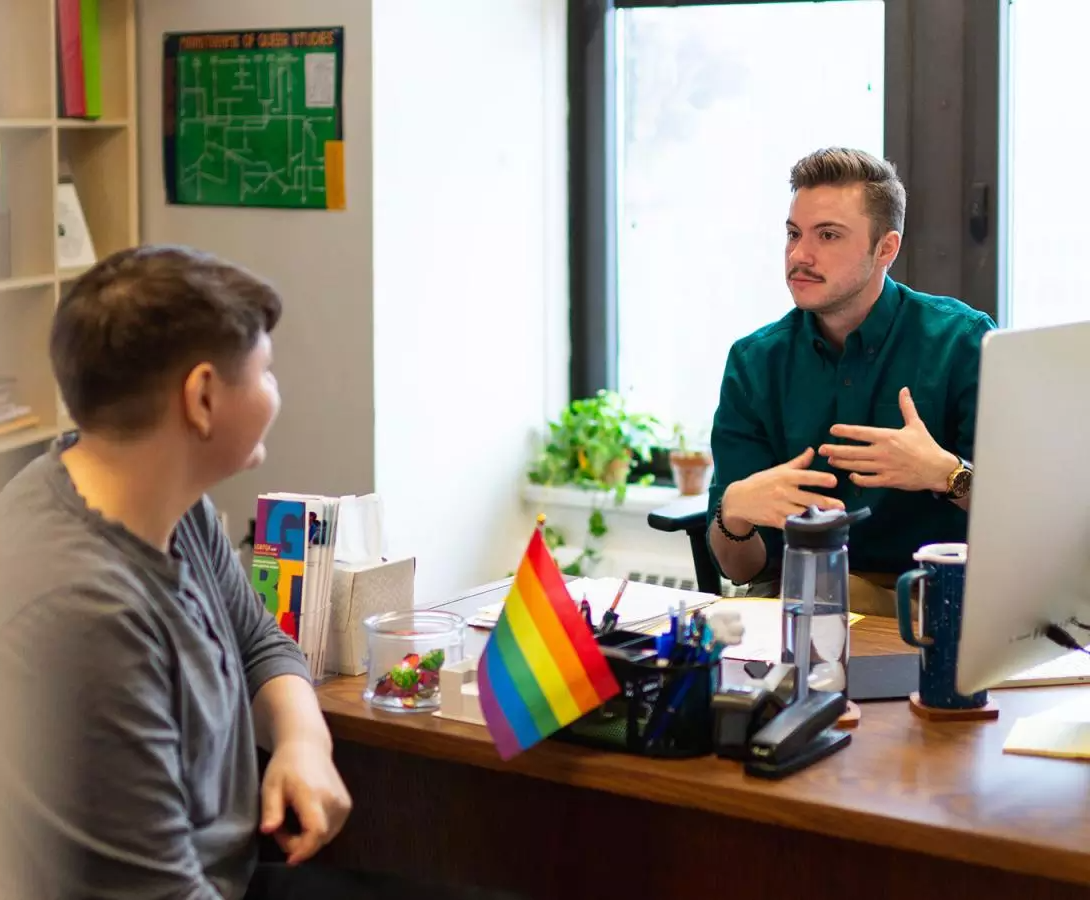Since his inauguration in January, President Trump has diminished or taken away a significant number of protections for LGBTQA+ people, as was the case in his first term served in 2017. He has rolled out several executive orders limiting the rights of those in the community, as well as demanded that many liberal universities across the country rescind their Diversity, Equity, and Inclusion (DEI) programs, effectively limiting LGBTQA+ students’ protections on campus.
Because of the administration’s actions, a state of uncertainty exists among students who rely on protections from their university against threats to the community. Not only are many of those protections being threatened by the administration, but also by those who support it. Pace University has a heavy emphasis on liberal arts, so naturally, the fear factor among students has grown significantly since late January, with many wondering if the protections Pace provides for them will dwindle away as time passes.
Austin Chappelle is a junior student on campus and a transgender man. He explains some of his and other LGBTQA+ students’ fears now that this new administration has taken form.
“The general consensus I have seen as a trans student is that people are very afraid of how things will roll back because of how this administration is pushing campuses to pull back on their DEI,” Chappelle said. “DEI is important because it allows people to have accessibility, but when it comes to trans people, this administration has been targeting us very specifically. So there is a very big fear that we are going to lose the protections that we have. We want to see on this campus that this fear-mongering happening in other schools isn’t going to be accepted or tolerated and that the protections we have will still be available.”
As of now, Pace University has stuck strongly with its DEI initiatives, which is promising for many, but there remains a feeling of uneasiness as students feel unsafe under the country’s returning leadership.
“Seeing everything going on outside of this school, the way that Pace has held their commitments I think is very important,” Chappelle continued. “I just feel like it’s important to continue to advocate and continue to push that those protections are kept in place, regardless of what the administration tries to do.”
Alisha Bhandari is a junior and the current president of Pride at Pace. They provide an understanding of the general feeling of LGBTQA+ students on campus, as well as offer advice to those in the community who are uneasy about their safety.
“I think a lot of students are fearful of the future,” Bhandari said. “So many changes have occurred that makes us feel like we’re running backwards, and now we’re sitting at the edge of our seat, jaws and hands clenched, waiting for something new to happen that will threaten our existence and wellbeing. It’s terrifying for me to think about, I can’t imagine what others feel.”
Bhandari emphasizes the need for supportive communities and staying informed, especially given the challenges facing queer individuals today.
“It can be hard to communicate your fears with people who can’t relate or understand the reality of what it means to be queer in the current political climate. Additionally, to those who are not queer, check in with your queer friends. Stay updated to the news to the best of your ability while exercising mindfulness. And if you are queer but are not out yet, protect yourself. Be safe. It’s okay to not feel ready yet.”
I also spoke with Nailah Brown, a junior and the incoming President of Pride at Pace for the 2025-26 school year. They gave their perspective on the current climate of LGBTQA+ life on campus, and how worries have grown since the Trump Administration took form.
“The threat that DEI programs and safe spaces will lose funding or cease to exist altogether is very real, and very concerning,” Brown said. “They act as a lifeline for struggling students, places to make friends with other members of the community, and are an overall reminder that we exist and we aren’t going anywhere. Every day I feel like I meet a new queer person and it makes me happy to see how many of us there are on such a small campus.”
Brown also spoke about what they are looking forward to in their role as President of Pride at Pace next school year.
“I have a lot to learn, but I am enthusiastic about making new connections with cool people and hosting fire events! I want to remind everyone that if we are to remain positive throughout the next four years, we need to upkeep our community and find ways to have fun while remaining safe, educated, and informed.”
Jimmy Luckman is the director of the LGBTQA+ Center on both the New York City and Pleasantville campuses, who was recently announced to have the role back in March this year. I spoke to him to get a better understanding of the resources they provide for students and the changes they have made since Trump’s election.

Luckman explains that the center collaborates with many campus entities, including Residential Life to provide gender-affirming housing, the Center for Student Engagement to support student groups like Pride at Pace, and the Division of DEI to host events about sexual awareness.
“Because Pleasantville is such a small, close-knit community, we’re able to work closely together with different campus partners. So the resources aren’t something that are in the confines of the center.”
Luckman infers that there might be some fear among LGBTQA+ students to be recognized as such.
“I think that some students are cautious about sharing elements of their identity. There may be some hesitancy of being seen going into the LGBTQA+ Center, or drawing attention to themselves at events we host. I think that just being recognized within the community for some has been a challenge.”
Because of this, the center will be doing different programming for the upcoming fall semester.
“The new programming would involve going inside the residence halls if they don’t want to be seen outside in that capacity, as well as doing some different tabling events. We’re going to engage in collaboration where we can meet students where they’re at as opposed to coming directly to the center.”
Luckman continues, explaining how the center will be committed to helping students struggling under the new restrictions they are facing under the Trump administration, and expects to see an increase in students using the center due to these problems that have arisen. Not long after being named to the position, Luckman has already started working with security on campus to create training that helps them acknowledge preferred names and pronouns. The center will also start instituting Safe Zone training to help with language, understanding identities, and building community.
The LGBTQA+ center is open nine to five Monday through Friday, where anyone can speak with Luckman or one of seven student assistants who can help with counseling and resource referrals.
In the current political climate, it is more crucial now than ever to find community and take full advantage of the resources available to you. It is okay to be fearful, but it is important to note that student leaders and the LGBTQ+ center are actively working to create support systems for those who need.

